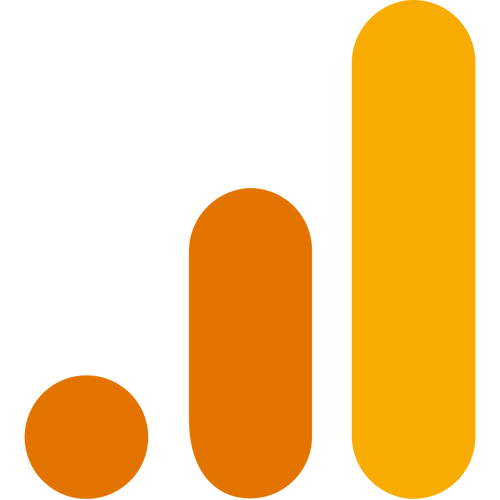Google Analytics is one of the most critical tools for analyzing site visits scientifically. It helps to know the obstacles facing the visitors that prevent them to convert.
Why do we need digital analysis?
Digital analytics is divided into two parts:
1- Analyze qualitative data such as the quality of the target group of visitors in terms of geographical location.
2- Analyze quantitative data such as calculate the number of visitors to your site for a certain period of time.
Analytics is based on your web activity, competition, and search on your target audience or the category you want to target, in order to improve your website’s performance and quality.
Moreover, understanding visitors’ behavior on your site so that you can achieve the results and goals you want.
How to benefit from Google Analytics?
To be able to analyze properly and reap the desired results, you must be clear about your goals!
You should start by defining your main goals then break them into sub-goals, and work to achieve them sequentially (Step-By-Step).
Optimal analysis method?
There are key performance indicators (KPIs) for all websites or mobile apps that relate to business goals and actions. For example, Conversion Rate and Conversions is the process of converting a visitor to a customer such as purchases made on an e-commerce site.
These are “strong or interactive” conversions because visitors are interacting with the products of the site, and some actions on the website may have behavioral indicators, such as a customer’s failure to purchase the products and therefore your main goals, the process of buying the products, have not been fully met, but are approaching them such as: Subscribe to our mailing list (subscriber) or notifications to receive updates about your site via email. These are “medium or semi-interactive” conversions, and it is important to measure both strong or medium conversions so that you have more behavioral data that helps you understand experiences and help you achieve the right results for your site. These measures are only measured by Google Analytics.
Classification of data:
You can segment your data according to the following criteria:
Date and time: Compare the different behavior of visitors who visit your site on certain days of the week.
The device used: to compare visitor performance on desktops, tablets, and mobile devices.
Marketing channel: to compare the difference in the performance of diverse marketing activities.
Geographic location: Specifies which countries, regions, or cities perform best.
Customer attributes: like existing customers versus new customers which help understand what attracts your loyal customers.
How does Google Analytics work?
First, Google Analytics collects the data from your website using small Javascript codes. You must place these codes on every page of the site, or if you use a Google Analytics-compliant site as a Blogger or CMS, The digital tracking of your Google Analytics account serves the purpose of placing the tracking number on its own place in the backend i.e. “UA-36457479-1”.
Second, when visitors arrive at your website, this code will begin to gather different pieces of information about how a visitor reaches & interacts with your websites, such as URL, language, browser name/version, the operating system, the device, and the referring source
Then, Google Analytics store and process the raw data where it can be converted to more specialized data. For example, during processing, the type of devices categorized as Laptops or computers, and then GA applies your data filters such as excluding data from your company’s visitors, taking into account that the configurations you have selected It is stored in the database, and it is important to note that it cannot be changed anymore, and you can extract this data in the form of reports so that your analysis is presented in the systematic way you want.
The axes in which Google Analytics works are to describe visitor characteristics such as geographic location, referral sites, and your site’s page names. Metrics are numerical statistics that help you understand visitor behavior. You can also set Google Analytics to track conversion rates when visitors perform actions such as the number of signups to a newsletter or purchase a product.
There are several important metrics you should know:
- Visitors (Users): Calculates the number of visitors to the site during a specified period of time.
- Visits (Sessions) & Duration: Calculates the time visitors spent on your website which enables you to know how attractive a page to the visitor, know which pages are most attractive to visitors.
- Pageview: The number of pages viewed on your site, and the most viewed topics on your site to see what kind of topics your audience likes.
- Bounce rate: This is the ratio of the total number of visitors who viewed only one page of the site to the total number of all visitors to the site and leave it.
- Time-based metrics: used to know the following:
Time on page: The time when a series of visitor interactions took place on your site.
= “First Page Entry Time – Second Page Entry Time”.
Visit duration: Different from browsing time, which is the difference between the time for the first interaction of the visitor on your site from the time of the last interaction.
= “Visitor first interaction on the page – Last interaction on page”
Conclusion:
We conclude that the importance of digital analysis for site owners and applications and the strength and accuracy of the Google Analytics system in the digital analysis of sites, making it the best analytical systems.
It is important that we understand how it works and the standards on which it is based so that we know how to benefit from this tool.
Our Data Analytics Expertise
Daam Al-Arabia is the leading Data Analytics agency in the Kingdom of Saudi Arabia. With over a decade of industry expertise, we have had fruitful partnerships with some of the Kingdom’s largest companies across various industries. Here’s an overview of our areas of excellence.
Our Data Analytics Guarantees
Quick, Easy Integration
Connect all your touchpoints and let the magic unfold.
Seamless Onboarding
Work with our specialists for an easy onboarding experience.
Immediate Impact
Get immediate and long term results from the go-live date.
SpeedyPlus Support
Receive expert technical support within 2 business hours.
Our Data Analytics Tech Stack
Send Us A Message
Quick Contact
Quick Contact
Trusted by some of the biggest companies in the Kingdom











